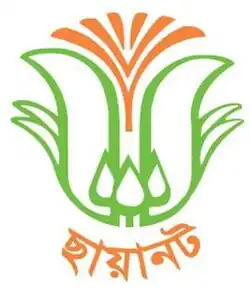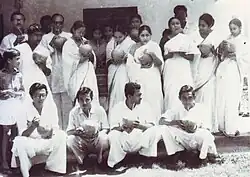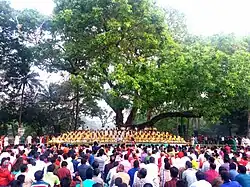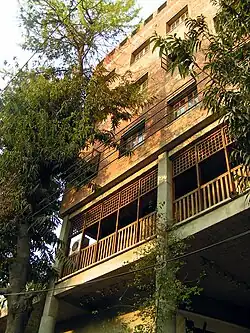Chhayanaut
ছায়ানট | |
 Chhayanaut logo | |
| Formation | 1961 |
|---|---|
| Type | Cultural |
| Headquarters | Dhaka |
| Location |
|
Official language | bn |
| Website | chhayanaut |
The Chhayanaut (Bengali: ছায়ানট) is an institution devoted to Bengali culture, founded in Bangladesh in 1961. As in the case of many similar organizations, it was established during Pakistani rule in Bangladesh to promote and nurture the cultural and musical heritage of Bengal. Every year, Chhayanaut arranges activities in order to celebrate the Pahela Boishakh, the first day of the Bengali new year.[1][2][3][4]
Chhayanaut hosts numerous cultural events throughout the year. These include the Nababarsha or 'Bengali New Year' celebration held beneath the Banyan Tree at Ramna, commemorations of various national holidays, festivals dedicated to Rabindranath Tagore and Kazi Nazrul Islam including their birth and death anniversaries, as well as seasonal programs. Additionally, they organize folklore and folk music festivals, theatre festivals, dance ceremonies, and speeches by esteemed experts. Among their regular activities, Chhayanaut operates a music center and a cultural and general education school called "Nalanda." They also conduct a program called "Shikhad" to introduce children to Bengali culture. They have initiatives to provide activities for autistic babies as well as the elderly. Furthermore, they publish a Bengali quarterly magazine titled "Bangladesher Hridoy Hote" that focuses on literature and culture.[4]
In 1964, on the occasion of Bengali new year 1371, Chhayanaut began celebrating Bengali New Year under the banyan tree at Ramna Park. Over time, this celebration grew into a major national cultural event. Chhayanaut also organizes programs to commemorate the birth and death anniversaries of Rabindranath Tagore (25th Boishakh and 22nd Srabon), as well as seasonal festivals like Autumn and Spring Festival.[5]
History
Pakistan Period
In the 1960s, the military regime of Pakistan banned the performance and broadcast of Rabindra Sangeet in then-East Pakistan. In defiance of the ban, legendary Rabindra Sangeet singer Kalim Sharafi, along with others, helped establish Chhayanaut, an organization dedicated to music, drama, and dance. Despite the prohibition, branches of Chhayanaut spread discreetly across district towns like an underground network. After the centenary celebration of Rabindranath Tagore in 1961, a group of cultural activists, among them Mokhlesur Rahman (popularly known as Sidhu Bhai), Shamsunnahar Rahman, Sufia Kamal, and Wahidul Haq, took the initiative to form a progressive cultural organization. The name "Chhayanaut" (signifies the shade of a tree) was proposed by Saeedul Hasan.[6][7][8]

In 1961, the first executive committee of Chhayanaut was formed with Sufia Kamal as President and Farida Hasan as General Secretary. Zahur Hossain Chowdhury and Saeedul Hasan served as Vice Presidents, while Saifuddin Ahmed Manik and Mizanur Rahman Chhana were Joint Secretaries. Mokhlesur Rahman was the Treasurer. Other members included Kamal Lohani, Waheedul Haq, Sanjida Khatun, and Ahmedur Rahman, among others.[7]
Chhayanaut held its first program at the Engineers Institute auditorium, which featured a collection of old Bengali songs. In 1963, under the initiative of Sanjida Khatun, music classes were started on the verandah of the Bangla Academy. Sanjida Khatun and Farida Malik taught Rabindra Sangeet, Bazlul Karim taught tabla, Mati Mia taught violin and sitar, and Sohrab Hossain taught Nazrul Geeti. That same year, the Chhayanaut Music School was officially established and inaugurated by Ustad Ayet Ali Khan on the first day of the Bengali year 1370 (1963 CE).[5]
Chhayanaut’s early activities began at the English Preparatory School (Later renamed as Udayan Higher Secondary School). Due to government pressure, the organization had to relocate its operations to Agrani School and College, and later to Lake Circus Girls’ School out of fear of further obstruction. Chhayanaut remained there until 1971.[5]
During the Bangladesh Liberation War
When the Liberation War began in 1971, many key figures of Chhayanaut, including Wahidul Haque and Sanjida Khatun, were forced to take refuge abroad. In Kolkata, they, along with other like-minded artists, formed the Mukti Sangrami Shilpi Sangstha (Freedom Fighters' Artists' Association). Many prominent artists outside of Chhayanaut also joined this collective. The group performed regularly in refugee camps and freedom fighters' bases, using music and art to inspire and uplift the spirit of resistance. As part of this effort, the group staged a musical play titled Rupantorer Gaan, written by Shahriar Kabir. The script underwent several changes over time. They performed at Rabindra Sadan in Kolkata, where legendary artists such as Hemanta Mukhopadhyay, Debabrata Biswas, Kanika Bandopadhyay, and Suchitra Mitra joined and sang in solidarity. The group raised funds through these performances, and each of them would contribute the money they earned individually to a collective fund dedicated to supporting the liberation movement. This historic cultural movement later became the subject of filmmaker Tareque Masud’s documentary Muktir Gaan.[9][10][11]
Independent Bangladesh (1971 - Present)
From 1971-2000
After Bangladesh’s independence, Chhayanaut was allowed to operate on the premises of the University Laboratory School and College at the University of Dhaka for nearly three decades. This arrangement was made possible by Dr. Nurun Nahar Faizunnnesa, then principal of the school, with formal approval from Professor Mozzafar Ahmad Chowdhury, the Vice Chancellor at the time.[5][12]
Eventually, Chhayanaut received a permanent home in Dhanmondi. In 1999, the Government of Bangladesh allotted one bigha (0.33 acre) of land in recognition of the institution’s significant contributions to Bengali cultural development over four decades. The Chhayanaut Sanskriti Bhaban was built on this land, designed by architect Bashirul Haq. The building complex includes thirty classrooms, a 300-seat modern auditorium, the Romesh Chunder Dutt Memorial Auditorium, a music and cultural library, the Poet Shamsur Rahman Library, and Sanskriti Samvar—an audiovisual center and recording studio.[12]

Ramna Batamul bombings
On 14 April 2001, during Chhayanaut’s Pohela Boishakh programme at Ramna Batamul, a terrorist attack took place. As the song “E ki Oporup Rupe Ma Tomay Herinu Polli Jononi” played, two bombs exploded at the venue, which was being broadcast live on Bangladesh Television (BTV). Seven people died on the spot, and three more later succumbed to their injuries, with nearly 50 others injured. The cultural event was immediately disrupted. The Islamic fundamentalist group Harkat-ul-Jihad al-Islami (HuJI) was behind the attack. Among the dead was one HuJI militant. Police filed two cases related to murder and explosives. In 2009, charges were brought against 14 HuJI members. In 2014, eight were sentenced to death and six to life imprisonment. However, in 2025, the High Court commuted the death sentences of seven surviving convicts, reducing one to life imprisonment and the rest to 10 years’ rigorous imprisonment. Some life sentences were also reduced, and two of the convicts who died while awaiting appeal were acquitted. The state has since announced plans to challenge the reduced sentences. Mufti Abdul Hannan, HuJI’s top leader, had already been executed in 2017 in a separate case.[13][14][15]
After the attack, host Hasan Imam condemned the incident live on air. Chhayanaut later released a statement affirming: this act of terrorism would not deter Bengalis from celebrating Pohela Boishakh.[7]
Post 2001

In 2020 and 2021, Chhayanaut cancelled its annual Pohela Boishakh celebrations at Ramna Batamul due to the COVID-19 pandemic. Instead, the organization focused on supporting the poor and vulnerable during the crisis.[16]
Recognition
In 2015, in recognition of cultural harmony, Chhayanaut received the Rabindranath Tagore International Award, instituted by the Government of India.[17] On the morning of Monday, February 18, 2019, at a ceremony held at the Pravasi Bharatiya Kendra in New Delhi, the President of India, Ram Nath Kovind, presented the award to Chhayanaut’s president, Sanjida Khatun.[18][19]
In 2019, Chhayanaut received the Shilpakala Padak as a creative cultural organisation for its outstanding contribution to Bangladesh's cultural landscape. The award was accepted by Laisa Ahmed Lisa, the organization’s general secretary, at a ceremony held at the National Theatre Hall in Dhaka.[20][21]
Notable alumni and faculty
- Mita Haque, Rabindra Sangeet[22]
- Khurshid Khan, Sitar[23]
- Chandana Mazumdar, Folk music[24]
- Murtaza Kabir Murad, Classical flute[25]
- Shaheen Samad, Folk music[24]
- Khairul Anam Shakil, Nazrul Geeti[24]
- Syed Saad Andaleeb, Academic[26]
- Sheikh Kamal, Politician and Military officer[27]
References
- ^ "Baishakhi breeze blows across the country". The Daily Star. Retrieved 2009-10-08.
- ^ "Pahela Baishakh: The Cultural Essence". The Financial Express. Retrieved 2009-10-08.
- ^ "PAHELA BAISHAKH". Bangladesh Parjatan Corporation. Archived from the original on 2010-03-13. Retrieved 2009-10-08.
- ^ a b Mohammad, A. H. "Chhayanaut". Banglapedia. Retrieved 2024-02-25.
- ^ a b c d Mamoon, Muntasir (2009). ঢাকা : স্মৃতি বিস্মৃতির নগরী (২য় খন্ড) (in Bengali). Dhaka: Ananyā. p. 66. ISBN 9847010501.
- ^ Basu, Anjali (2019). সংসদ বাঙালি চরিতাভিধান, দ্বিতীয় খণ্ড (in Bengali). Kolkata: Sahitya Samsad (India). p. 83. ISBN 9788179551356.
- ^ a b c নূর, জাহীদ রেজা (2025-04-14). "বটের ছায়ায় ছায়ানট". Prothomalo (in Bengali). Retrieved 2025-08-01.
- ^ Mallick, Sadya Afreen (2017-04-14). "Chhayanaut: From a seed to a protective tree". The Daily Star. Retrieved 2025-08-01.
- ^ নূর, জাহীদ রেজা (2025-03-25). "একান্ত সাক্ষাৎকারে সন্জীদা খাতুন যা বলেছিলেন". Prothomalo (in Bengali). Retrieved 2025-08-01.
- ^ "ছায়ানট: মুক্তিযুদ্ধের চেতনা বিনির্মাণই ছায়ানটের লক্ষ্য". Dainikbangla. Retrieved 2025-08-01.
- ^ Masud, Tareque (February 2012). চলচ্চিত্রযাত্রা [Cholocchitrojatra] (in Bengali). Bangladesh: Prothoma Prokashan. pp. 12–25. ISBN 9789843338860.
{{cite book}}: CS1 maint: year (link) - ^ a b "Chhayanaut - Banglapedia". en.banglapedia.org. Retrieved 2025-08-01.
- ^ "2001 Ramna Batamul attack: A timeline". The Daily Star. 2024-04-14. Retrieved 2025-08-01.
- ^ "RAMNA BATAMUL BLAST: HC commutes death sentence of 7 convicts". www.newagebd.net. 2025-08-01. Retrieved 2025-08-01.
- ^ "rediff.com: 9 killed in bomb attack in Bangladesh". www.rediff.com. Retrieved 2025-08-01.
- ^ "Chhayanaut will not celebrate Pohela Boishakh this year either". Dhaka Tribune. Retrieved 2025-08-01.
- ^ "Bangladesh's Chhayanaut gets India's Tagore Award for Cultural Harmony 2015". bdnews24.com. Archived from the original on 4 March 2025. Retrieved 2025-03-04.
- ^ "Chhayanaut honoured with Rabindranath Tagore Award for Cultural Harmony in India". bdnews24.com. 18 February 2019. Archived from the original on 4 March 2025. Retrieved 2025-03-04.
- ^ "Chhayanaut named for Tagore Award for Cultural Harmony". The Daily Star. 2018-10-25. Archived from the original on 4 March 2025. Retrieved 2025-03-04.
- ^ "18 artists, two organisations to receive Shilpakala Padak 2019, 2020". Prothomalo. 2021-06-13. Retrieved 2025-08-01.
- ^ "Shilpakala Padak 2019, '20 awarded". www.newagebd.net. 2025-08-01. Retrieved 2025-08-01.
- ^ "Chhayanaut pays tribute to Rabindra Sangeet legend Mita Haque". Dhaka Courier. 9 July 2021.
- ^ "Ustad Khurshid Khan Passes Away". The Daily Star. 22 January 2012.
- ^ a b c সঙ্গীতবিদ্যায়তন: কার্যক্রম [Music Academy: Activities]. Chhayanaut (in Bengali). Retrieved 23 June 2025.
- ^ "Euphoric flute recital at Chhayanaut". The Daily Star. 3 April 2016.
- ^ Andaleeb, Syed Saad (2 March 2024). "Chhayanaut at 60: In remembrance" (Opinion).
- ^ "Sheikh Kamal's birth anniv today". New Age. 23 June 2025.